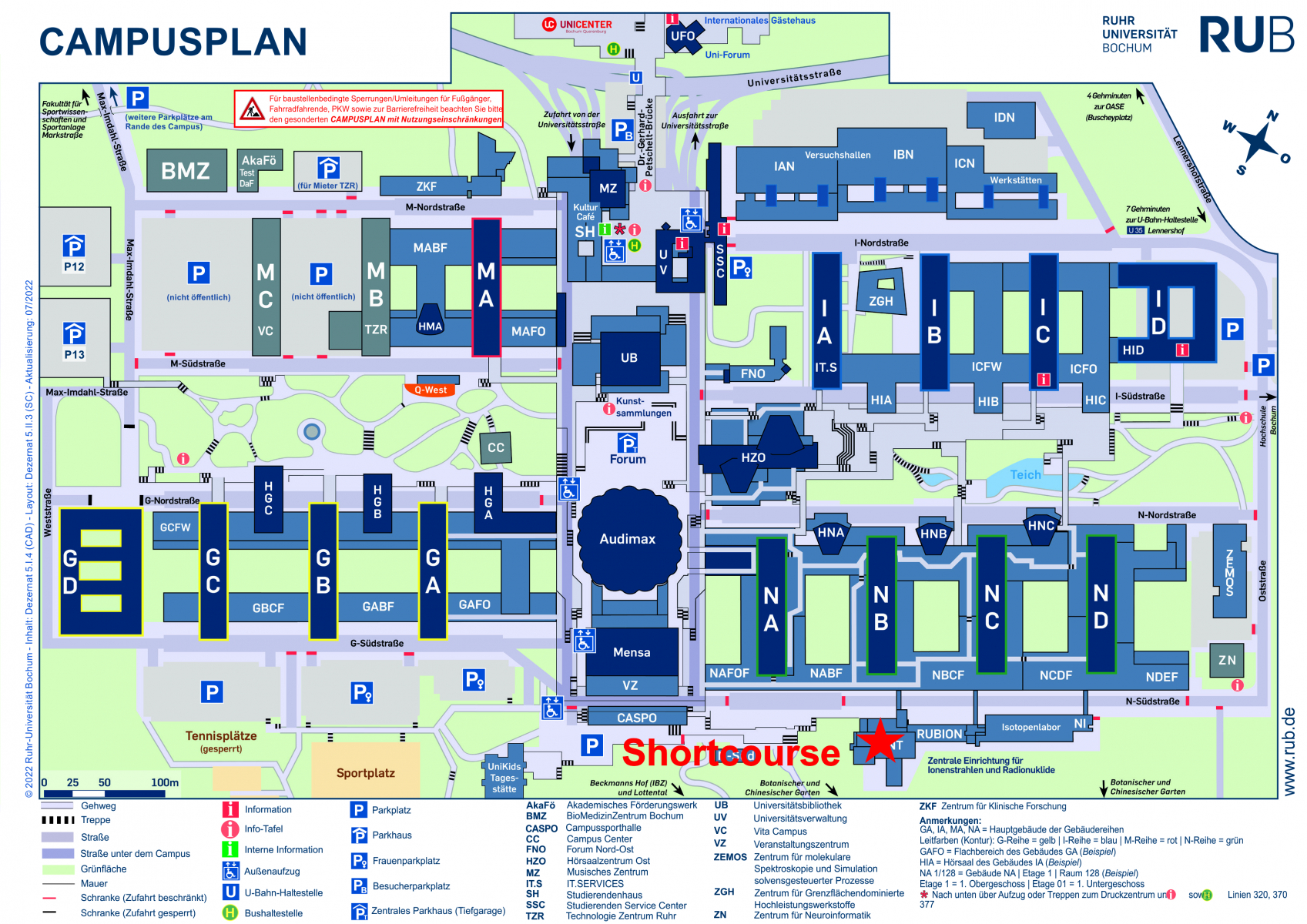Diffusion Workshop – 21-25 October 2024
We would like to draw your attention to a short course on the
Application of diffusion studies to the determination of timescales in geochemistry and petrology (diffusion chronometry / geospeedometry)
to be held at the RUBION, Ruhr-University Bochum, Germany, by staff of the Universities at Bochum and Hannover as part of a joint Research Unit (FOR 2881) that is run by the two institutions.
About the Workshop
Content: The course is directed at petrologists, geochemists, volcanologists and planetary scientists interested in retrieving information on timescales of processes from their rocks. Such information might include the residence times of magmas in their reservoirs, the cooling- or exhumation rates of rocks, the duration of terrestrial or extraterrestrial (e.g. parent bodies of meteorites) metamorphism, the duration of fluid flow (e.g. metasomatism by fluids / melts in the crust or mantle), and the evaluation and application of closure temperatures. Our focus will be on high temperature processes. Therefore „high temperature Thermochronometry“, „Diffusion Chronometry“ or „Geospeedometry“ are related keywords that may describe the course contents.
Goals and expected profile of participants: Previous experience with numerical modeling or programming is not required, but an interest in learning the rudiments of these tools is. One of the objectives of the course, however, is to demonstrate how much it is possible to accomplish without any or with very little programming. The basic information on diffusion that is required for carrying out such calculations will be provided, but this is not a course designed to cover all aspects of diffusion in minerals and melts.
In addition to instruction via lectures, a major component of the course will be hands on training to enable participants to „do your own“ modeling. Participants will be expected to bring their own laptop computers with Excel and Matlab installed on those. Knowledge of Matlab is not required – instructions will be provided during the course. All instruction and exercises will be in English.
The course material will be designed for graduate students or postdocs starting off in the fields mentioned above, but participants with all levels of experience and expertise are welcome. To maintain the hands-on nature of the course, we expect to restrict the number of participants to around 30, to be given out on a first come first serve basis. Interested participants can express intention to register by sending an email containing a brief paragraph describing their background / reasons for wanting to participate to: diffchron@rub.de
Venue (RUBION)
RUBION – CENTRAL UNIT FOR ION BEAMS AND RADIONUCLIDES
Ruhr-Universität Bochum
Universitätsstraße 150
44780 Bochum
Building: NT
Rooms: –
Please notice that the building NA was ragged, and there is an ongoing construction side around the place. More information will follow soon!
Travel to Bochum
Bochum is located in the heart of Europe and is, therefore, very conveniently accessible by road, train, and air. Düsseldorf and Dortmund are the nearest airports. Frankfurt may be reached by train in 2 hours and Cologne-Bonn in about 1.5 hours. The surrounding region, which includes Cologne and Düsseldorf, is densely settled and boasts a world-renowned cultural infrastructure.
Airport:
The most conveniently located airport is the airport at Düsseldorf (DUS), which is connected by major airlines to destinations all over the world (http://www.dus.com/en). It offers frequent train connections to Bochum, including ICE, IC, and RE trains (35 minutes) and S-Bahn trains (60 minutes). Possible options to go from Düsseldorf to Bochum by regional train are the RE1, RE6, RE11 and the S1.
The closest airport is a small regional one in Dortmund-Wickede (DTM) (http://www.dortmund-airport.com). It serves European no-frills airlines but is difficult to reach by public transport.
Train:
The Ruhr-University is well-served by public transport. Fast ICE/IC/EC trains connect all parts of Germany (https://int.bahn.de/en). Download the DB-Navigator app to get information about connections and ticket options.
Here’s a tip to make your travel within Germany more convenient. Consider purchasing the ‘Deutschland ticket’ for 49€. With this ticket, you can use all RE, S-Bahn trains, buses, and the underground/subway in Bochum and anywhere else in Germany. It’s valid for a month and giving you flexibility in your travels. Just remember, if you choose this ticket, you won’t be able to use the fast trains (ICE, EC, IC) or need to purchase extra tickets for them.
Car:
The Ruhr-University is easily reached by car (Autobahn A 43, Exit Nr. 19, Bochum-Querenburg/Ruhr-Universität). For navigation instruments, the street address is Universitätsstraße 150. However, be aware that parking options may be difficult to find because classes are in session.
Local Transport:
The U-35 Subway (U-Bahn) / tram line connects the main train station to the University (every 5 min during the day; travel time ca. 10 minutes) (https://www.vrr.de/en/). U-Bahn tickets may be bought at the central office of the regional transport service (VRR) located in the hallway below the train station’s main entrance or at ticket machines located at stops. Tickets need to be stamped in a machine, typically at the entrance of each tram/subway stop, before boarding the U-Bahn. An A-level ticket is required to travel to the University from the city centre. A single ride costs 3 Euros, but multiple ride tickets, day tickets, weekly tickets or the ‘Deutschland ticket’ are also available at reduced prices; please look up the websites or enquire at the VRR or the DB (Deutsche Bahn) office.
Accommodation
For accommodation, you can use common online websites, such as Airbnb and Booking.com, to find available spaces. For more information, check the city of Bochum’s website. There are limited options for accommodation close to the university itself. Therefore, options in the city centre of Bochum or close to the underground/subway U35 are highly recommended for an easy and fast connection to the university.
Useful links:
Scientific Program
Program for DMG-MSA Shortcourse / Workshop Bochum, 21-25 October 2024
Monday, 21. October
Fundamentals of Diffusion Chronometry
09:00 – 09:15 Welcome, Introduction and Technical / organisational aspects
09:15 – 10:45 Lecture 1 Physical aspects of diffusion in different media and definition of various diffusion coefficients
10:45 – 11:15 COFFEE BREAK
11:15 – 12:45 Lecture 2 Mathematical aspects of diffusion
12:45 – 14:00 LUNCH
14:00 – 15:30 Practical 1 Setting up a basic Excel Table for diffusion calculations
15:30 – 16:00 COFFEE BREAK
16:00 – 18:00 Practical 2 Fitting experimental diffusion profiles
Tuesday, 22. October
Measuring and modelling diffusion
09:00 – 10:00 Lecture 3 Factors controlling diffusion coefficients
10:00 – 10:30 Practical 2 continued Fitting experimental diffusion profiles and getting an Arrhenius relation
10:30 – 11:00 COFFEE BREAK
11:00 – 12:15 Lecture 4 Experimental approaches and the role of point defect thermodynamics
12:15 – 13:30 LUNCH
13:30 – 15:00 Lecture 5 Setting up a model
15:00 – 15.30 Lecture 6 Determining the crystallographic orientation of your crystal
15:30 – 16:00 COFFEE BREAK
16:00 – 17:30 Practical 3 Fitting natural diffusion profiles to get residence times
17:30 – 18:00 Case Study 1: Diffusion chronometry example
Wednesday, 23. October
Numerical methods and cooling systems (non-isothermal)
09:00 – 10:00 Lecture 7 Numerical methods
10:00 – 12:3 Practical 4 Modelling diffusion profiles with Excel using the method of finite differences:
(a) isothermal model
(b) cooling model to determine the cooling rate from fitting
(COFFEE BREAK in between)
12:30 – 14:00 LUNCH
14:00 – 14:30 Practical 5 Convolution in analytical measurements of diffusion profiles
14:30 – 15:30 Case study 2: Diffusion chronometry with garnet and aspects of multi- component diffusion
15:30 – 16:00 COFFEE BREAK
16:00 – 18:00 Practical 6 Modelling diffusion in garnet using a specialized program
Thursday, 24. October
09:00 – 10:30 Lecture 8 Closure temperatures/ Kinetically controlled thermobarometry
10:30 – 11:00 COFFEE BREAK
Modelling Diffusion using Matlab
11:00 – 12:30 Practical 7 Solving the same problems as before now using Matlab
12:30 – 14:00 LUNCH
14:00 – 15:30 Practical 7 continued
15:30 – 16:00 COFFEE BREAK
More advanced topics
16:00 – 17:00 Lecture 9 Phase field method – a sampling of what can be done
18:30 DINNER
Friday, 25. October
09:00 – 09:45 Lecture 10 Moving Boundaries
09:45 – 10:30 Case study 3: Image analysis for diffusion modelling using AI
10:30 – 11:00 COFFEE BREAK
11:00 – 12:30 Lecture 11 Novel methods for measuring diffusion coefficients including isotopic effects
12:30 – 14:00 LUNCH
14:00 – 15:00 Lecture 12 Diffusion in polycrystalline materials
15:00 – 16:00 Practical 8 Modelling element exchange through grain boundaries and fluids
16:00 Closing comments, discussion and Beer
Lecturers:
Institut für Geologie, Mineralogie und Geophysik, Ruhr-Universität Bochum
Sumit Chakraborty, sumit.chakraborty(@)rub.de
Ralf Dohmen, ralf.dohmen(@)rub.de
Maren Kahl, maren.kahl(@)rub.de
Interdisciplinary Centre for Advanced Materials Simulation (ICAMS), Ruhr-Universität Bochum
Julia Kundin, julia.kundin(@)rub.de
Institut für Mineralogie, Leibniz Universität Hannover
Renat Almeev, r.almeev(@)mineralogie.uni-hannover.de
Martin Oeser-Rabe, m.oeser(@)mineralogie.uni-hannover.de
Institute of Cartography and Geoinformatics, Leibniz Universität Hannover
Artem Leichter, artem.leichter(@)ikg.uni-hannover.de
Social Events
The icebreaker will start at 6 PM but feel free to join later if you can´t make it on time. Everyone is more than welcome to join the icebreaker, also those who didn´t reply to my e-mail.
Please note that the icebreaker is at your own expense.

